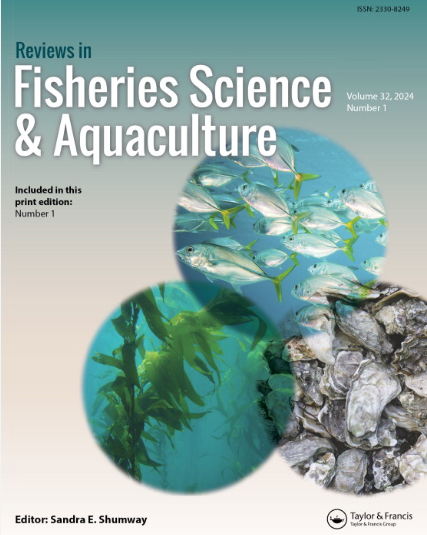Review and Meta-Analysis of the Environmental Biology and Potential Invasiveness of a Poorly-Studied Cyprinid, the Ide Leuciscus idus
IF 6.4
1区 农林科学
Q1 FISHERIES
引用次数: 6
Abstract
Abstract The ide Leuciscus idus is a large-bodied cyprinid native to freshwaters around the Baltic, Black, Caspian, White, Barents, Kara, Laptev and North seas as well as the Aral Sea region. Historically an important commercial species, the ide is used in recreational fisheries and as an ornamental fish, and is subject to translocation and stocking events. The ide is less well-studied than many European cyprinids and relatively little is known of the risks it poses to native species and ecosystems where introduced. The present review and meta-analysis examine available data on the ide’s environmental biology to provide an assessment of its potential invasiveness. A long-lived, omnivorous species, the ide is a habitat generalist that inhabits lowland rivers and nutrient-rich lakes, but also some brackish waters where it is facultatively anadromous. The ide displays variable age and length at maturity and asymptotic growth in body length, can be highly productive and migratory, and can withstand variable environmental conditions. Despite several attributes that should facilitate acclimation to novel environments, the ide has established relatively few self-sustaining populations outside its native range, and is therefore not currently considered to be invasive. However, as introductions are likely to continue, increased propagule pressure could lead to the development of invasive non-native populations in some locations.一种研究较少的鲤鱼的环境生物学和潜在入侵性的综述和Meta分析
摘要Leuciscus idus是一种大型塞浦路斯鱼,原产于波罗的海、黑、里海、白、巴伦支、卡拉、拉普捷夫和北海以及咸海地区的淡水水域。ide在历史上是一种重要的商业物种,用于休闲渔业和观赏鱼,并会发生迁移和放养事件。与许多欧洲塞浦路斯类相比,该ide的研究较少,对其对引入地的本地物种和生态系统构成的风险也知之甚少。本综述和荟萃分析检查了ide环境生物学的可用数据,以评估其潜在的入侵性。ide是一种长寿的杂食性物种,是一种广泛的栖息地,栖息在低地河流和营养丰富的湖泊,也有一些半咸水水域,在那里它是兼性溯河产卵的。ide在成熟时表现出可变的年龄和长度,体长逐渐增长,可以高产和迁徙,并且可以承受可变的环境条件。尽管有几个特性应该有助于适应新环境,但ide在其原生范围之外建立的自我维持种群相对较少,因此目前不被认为是入侵性的。然而,随着引进工作的继续,繁殖体压力的增加可能会导致一些地区入侵性非本土种群的发展。
本文章由计算机程序翻译,如有差异,请以英文原文为准。
求助全文
约1分钟内获得全文
求助全文
来源期刊

Reviews in Fisheries Science & Aquaculture
FISHERIES-
CiteScore
25.20
自引率
0.90%
发文量
19
期刊介绍:
Reviews in Fisheries Science & Aquaculture provides an important forum for the publication of up-to-date reviews covering a broad range of subject areas including management, aquaculture, taxonomy, behavior, stock identification, genetics, nutrition, and physiology. Issues concerning finfish and aquatic invertebrates prized for their economic or recreational importance, their value as indicators of environmental health, or their natural beauty are addressed. An important resource that keeps you apprised of the latest changes in the field, each issue of Reviews in Fisheries Science & Aquaculture presents useful information to fisheries and aquaculture scientists in academia, state and federal natural resources agencies, and the private sector.
 求助内容:
求助内容: 应助结果提醒方式:
应助结果提醒方式:


